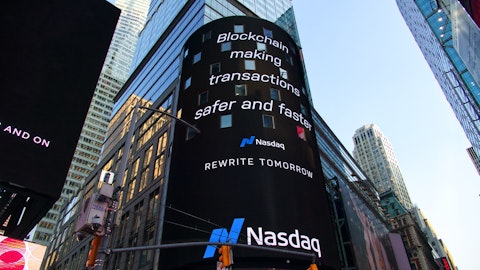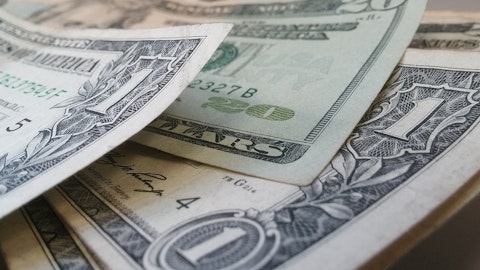In this article, we look at the 10 Worst ADR Stocks To Buy According to Short Sellers.
An American Depositary Receipt (ADR) is a certificate issued by a U.S. bank that represents shares of a foreign company. These certificates allow U.S. investors to buy shares in foreign companies as if they were regular U.S. stocks. ADRs make it easier for American investors to invest in foreign companies and help foreign companies attract investment from the U.S. without needing to go through the complicated process of listing directly on U.S. stock exchanges.
Despite benefits, less than 10% of large foreign companies list their shares in the U.S. First, some companies that don’t list in the U.S. may already be valued at a high level, so they don’t see much-added benefit. Secondly, the owners and managers of these foreign companies (often families) might not want a U.S. listing because it could limit their control and ability to benefit personally from the company.
Shifting Tides & Global Opportunities
Alibaba’s initial public offering (IPO) in 2014 was a landmark event, raising $25 billion in what was then the largest IPO in history. This success was part of a broader trend where numerous Chinese firms sought to list in the U.S., attracted by the potential for high valuations and access to global capital. Fast forward to recent years, and the picture has changed markedly. The once-vibrant market for Chinese IPOs on Wall Street has withered. In 2023, Chinese companies raised only about $580 million through U.S. listings, a dramatic drop compared to the previous years. This decline is exacerbated by geopolitical tensions between China and the U.S., which have created a challenging environment for Chinese firms seeking to go public abroad.
According to a report by the US-China Economic and Security Review Commission, there are approximately 256 Chinese firms on the New York Stock Exchange, NASDAQ, and NYSE American. However, the political and economic shift has impacted investor confidence and market performance. Notably, 11 Chinese firms, including prominent state-owned entities such as China Eastern Airlines and China Southern Airlines, have delisted from U.S. exchanges over the past year.
In the UK major companies such as Shell, are moving their listings to the U.S. markets as they tend to be valued higher in the U.S. than in the UK, which helps them raise more money and get better growth opportunities. Several factors such as Brexit, high interest rates, fewer tech companies, and a lack of domestic investors have contributed to this migration. More than 30 companies with a market capitalization of over $125 million are exiting the UK’s public equity markets. Thirteen companies have completed takeover bids, while 17 companies have delisted.
Given the weakness in the U.S. market, analysts forecast that now is a good time to invest in foreign stocks. Over the past 12 years, U.S. stocks have outperformed international stocks in 10 of those years, driven by a strong bull market. However, historically, international stocks have often outperformed, especially when the U.S. market isn’t as robust as it has been over the last decade. Morningstar data shows that international stocks outperformed in 60 of the 64 years when U.S. market returns were below 6%, and in all 45 years when returns were below 4%. During periods of U.S. market weakness, investors often seek growth opportunities abroad, which could position ADRs to outperform American stocks during the current bear market.
While the U.S. market has enjoyed a prolonged period of dominance, the shifting global landscape presents a compelling case for diversifying into international stocks. With geopolitical dynamics, economic uncertainty, and the potential for weaker U.S. market returns in the coming years, foreign companies offer growth opportunities that American stocks may struggle to match. With that in context let’s take a look at the 10 worst ADR stocks to buy according to short sellers.

Photo by Pascal Bernardon on Unsplash
Our Methodology
For this article, we used the Finviz stock screener to find the foreign companies listed in the US. From that list, we shortlisted companies that have the highest percentage of shares outstanding that were sold short as of September 18. The list is sorted in ascending order of their short float as of September 18.
Why do we care about what hedge funds do? The reason is simple: our research has shown that we can outperform the market by imitating the top stock picks of the best hedge funds. Our quarterly newsletter’s strategy selects 14 small-cap and large-cap stocks every quarter and has returned 275% since May 2014, beating its benchmark by 150 percentage points (see more details here).
10 Worst ADR Stocks To Buy According to Short Sellers
10. Immatics (NASDAQ:IMTX)
Short Interest as % of Shares Outstanding: 14.46%
Number of Hedge Fund Investors in Q2 2024: 33
Immatics (NASDAQ:IMTX) is a German biopharmaceutical company specializing in cancer immunotherapy. The company is developing new cancer treatments by focusing on immunotherapies that redirect cells to attack cancer by the Adoptive Cell Therapies (ACT) approach. This approach involves taking a patient’s immune cells or using cells from a donor, then modifying these cells in the lab to destroy cancer cells. The company also uses Antibody-like TCR Bispecifics molecules which are designed to activate immune cells against cancer cells.
On September 16, Immatics (NASDAQ:IMTX) unveiled its initial findings for IMA401 from its ongoing Phase 1 dose escalation trial, which demonstrated anti-tumor activity and a manageable safety profile. The data showed an objective response rate (ORR) of 29%, with confirmed responses in 25% of patients and a disease control rate of 53%. The company has announced that it will regain full rights to IMA401 following the end of its collaboration with Bristol Myers Squibb on December 12, allowing it to advance the drug independently and explore further clinical development opportunities. The company sees tremendous potential in the medication’s ability to deliver a meaningful impact on the lives of cancer patients.
Despite 14.46% of shares being shorted, 33 hedge funds showed a bullish stance on the stock, holding stocks worth $692.15 million as of the second quarter. Perceptive Advisors is the largest shareholder in the company, holding $93.96 million worth of stock as of June 30. Industry analysts maintain a consensus Buy rating for the company’s stock, with an average price target of $19.22 which represents a 44.21% upside potential from its current levels.
9. On (NYSE:ONON)
Short Interest as % of Shares Outstanding: 14.82%
Number of Hedge Fund Investors in Q2 2024: 34
On (NYSE:ONON) is a Swiss-based sportswear company specializing in performance footwear, apparel, and accessories. The company was founded in 2010 by former professional athlete Olivier Bernhard alongside Caspar Coppetti and David Allemann. The company is known for its patented CloudTec technology, which revolutionizes the running experience with its unique cushioning system. On (NYSE:ONON) partners with elite athletes such as Roger Federer and Zendaya and has expanded its presence worldwide.
In Q2, On’s (NYSE:ONON) sales increased by 28% to $672.56 million. The growth was especially evident in the Direct-to-Consumer and wholesale channels, both performing well despite some logistical challenges at the Atlanta warehouse. Their strategy emphasizes long-term goals, underscored by athlete performances at the Paris Games, where Hellen Obiri and Iga Swiatek brought home medals.
The company is enhancing its DTC sales through its e-commerce platform, which provides better margins than wholesale channels, and is rapidly expanding its global presence, particularly in key markets like the U.S. and China by opening new retail stores. The company’s partnerships with well-known athletes enhance its brand visibility and credibility, leading to strengthened customer relationships and improved profitability.
While 14.82% of the company’s shares are shorted, 34 hedge funds have maintained a bullish sentiment on the stock as of the second quarter with stakes worth $692.15 million. Select Equity Group is the largest shareholder in the company, holding $287.81 worth of stock as of June 30. Industry analysts forecast the company to increase its earnings by 82.51% this year.





